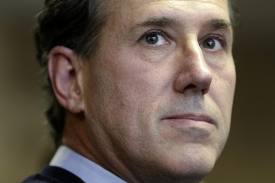Santorum’s Swan Song?

It appears that Santorum’s time as a serious contender for the Republican nomination is about to come to a close. It’s true that the experts (including me) have wrongly counted him out more than once so far. It’s also true that his close defeats in Michigan and Ohio hurt him less than I expected.
But now: What Romney has been missing is a big victory is genuinely competitive state. All the polls show him with a double-digit lead in Illinois, and the trend is in his direction. Given his huge organizational and financial advantages that are so important in gathering delegates, Santorum’s only chance is to show himself far more popular among Republicans than Romney by winning contest after contest. And it’s now clear that’s not going to happen.
Maybe the country’s most astute political analyst, Pete Spiliakos, does a more or less perfect job of assessing Santorum’s strengths and weaknesses. The strengths are more impressive than the weaknesses from a personal view. That’s why Rick outlasted all the other not-Romneys. But the weaknesses—although understandable in someone who rose so quickly and unexpectedly—turn out to be fatal:
It…appears that the Santorum’s campaign is having trouble properly organizing his speaking events. The lack of support for Santorum from the institutional Republican Party is disturbing but hardly disqualifying. Sure he has only a couple more congressional endorsements than Ron Paul and half as many as Newt Gingrich, but no one ever said that the Republican congressional caucus has a monopoly on political wisdom. But look at the picture. The two groups of politicians who know him best are in Pennsylvania (where he is from, and the state he represented in Congress) and Washington D.C. (where he has largely been based out of for the last twenty years). The Republican politicians from those two places are, at best, very cool to him. Maybe that tells us something important about what kind of general election candidate and President they fear Santorum would be. Santorum is a professional politician who has never held an executive position. His campaign so far has not done much to allay concerns about his executive competence.
So how has Santorum gotten this far? Because he has his virtues. He seems like a personally very decent guy (unlike Gingrich and Cain). He seems to have a set of firm principles (unlike Romney and Gingrich.) He is knowledgeable about national-level policy (unlike Cain, Perry, or Bachmann). He doesn’t quit after a few reversals (unlike Pawlenty). His campaign doesn’t ooze contempt for Republican primary voters (unlike Huntsman’s). He just doesn’t seem to have the rhetorical discipline and organizational ability to go all the way.
So a successful candidate outdoes his opponents when it comes to COMPETENCE, IDEOLOGY, RHETORICAL ELOQUENCE and DISCIPLINE, and CHARACTER.
For Republican primary voters (a category rather different from BIG THINK readers), Santorum’s character has the virtues of DECENCY, AUTHENTICITY, INFORMED INTELLIGENCE, and RESOLUTION. His ideological views are compatible with many of those who vote in Republican primaries, and his concerns are many of those voters’—especially the evangelical voters’—concerns.
But Santorum’s disorganization—together with his lack of executive experience—suggests INCOMPETENCE. And, although capable of speaking with genuine eloquence, his speeches—both what he says and the way he says it—have been undisciplined and otherwise SELF-INDULGENT. He has an attractive and cogent message on healthcare, but he hasn’t made it or anything else his focus. He says too much dumb or readily misunderstood or cringe-inducing stuff.
Just having seen the HBO movie on the Palin selection and the McCain campaign, it’s easy for me to see why responsible establishment Republicans would be putting an emphasis this time on executive competence.
But beating the president will require more than opening a competence gap.





